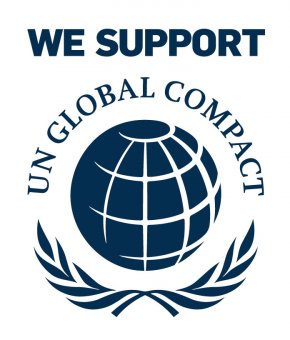Supporting the “United Nations Global Compact”
》 Main Goals 》 Value Creation Process
》 Materiality(Material Issues)
》 ESG Data
》 GRI Content Index 》 Outline of Activities
》 Website accessibility policy
》 Health and productivity management
》 Initiatives for Achieving SDGs 》 TCFD
》 Improvement of service quality
》 Annual Report(Integrated Report)
Artner signed the “United Nations Global Compact” (hereinafter UNGC) proposed by the United Nations and was registered as a business participant on January 16, 2024. In addition, Artner joined the “Global Compact Network Japan,” which comprises Japanese UNGC signatory companies and organizations, on the same date.
The UNGC is a voluntary initiative that provides a framework for companies and organizations to act as good members of society and achieve sustainable growth by exercising responsible and creative leadership.
UNGC signatory companies and organizations are required to support and continue their efforts to realize the Ten Principles of the UNGC regarding the protection of human rights, the elimination of unfair labor practices, environmental responsibility, and anti-corruption.
Artner’s basic sustainability policies are centered on “cultivating people,” “employee happiness,” “corporate governance,” and “contributing to society.”
We will support the Ten Principles of the UNGC in the four areas of “human rights,” “labor,” “environment,” and “anti-corruption,” and contribute to the solution of social issues through our business activities in accordance with our basic sustainability policies.

「The Ten Principles of the UN Global Compact」
| Human Rights | Principle 1: Businesses should support and respect the protection of internationally proclaimed human rights; and Principle 2: make sure that they are not complicit in human rights abuses. |
|---|---|
| Labour | Principle 3: Businesses should uphold the freedom of association and the effective recognition of the right to collective bargaining; Principle 4: the elimination of all forms of forced and compulsory labour; Principle 5: the effective abolition of child labour; and Principle 6: the elimination of discrimination in respect of employment and occupation. |
| Environment | Principle 7: Businesses should support a precautionary approach to environmental challenges; Principle 8: undertake initiatives to promote greater environmental responsibility; and Principle 9: encourage the development and diffusion of environmentally friendly technologies. |
| Anti-Corruption | Principle 10: Businesses should work against corruption in all its forms, including extortion and bribery. |
United Nations Global Compact: https://www.unglobalcompact.org/

